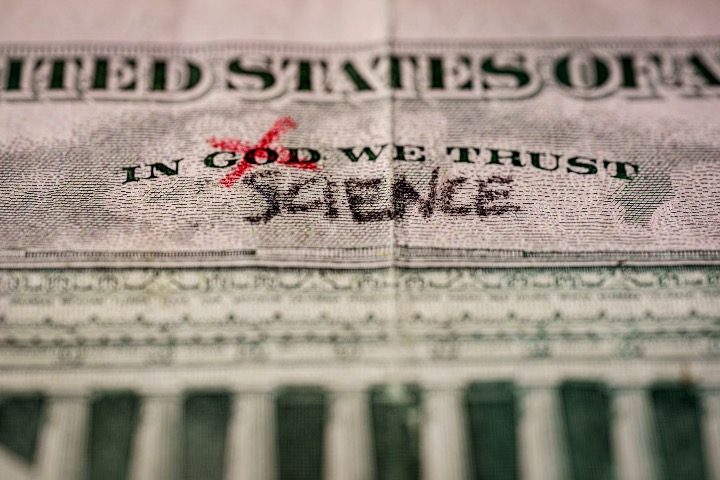
Many years ago, I read a quite rational atheist commenter online who said that while he didn’t believe in God, he feared what a de-Christianized West would bring. Now, a couple of decades later, he’s perhaps joined in that sentiment by the man who’s probably the world’s most famous living atheist, evolutionary biologist Richard Dawkins.
On British talk-radio station LBC recently, Dawkins admitted that he enjoys living in a Christian society and considers himself a “cultural Christian.” While this isn’t exactly a road-to-Damascus moment, it’s nonetheless quite an admission from a once staunchly militant atheist most famous for writing the 2006 book The God Delusion.
Yet Dawkins now exhibits the have-your-cultural-cake-and-eat-it-too delusion. His contradiction, however, is many people’s — and his story holds a lesson we ignore at our peril.
As The Telegraph’s Madeline Grant wrote last week in “Christianity’s decline has unleashed terrible new gods”:
Before we start preparing the baptismal font, it’s worth noting that Dawkins says he remains “happy” with the UK’s declining Christian faith, and that those beliefs are “nonsense”. But he also says that he enjoys living in a Christian society. This betrays a certain level of cultural free-riding. The survival of society’s Christian undercurrent depends on others buying into the “nonsense” even if he doesn’t.
For sure. It’s a bit like living in a commune (social codes and traditions are at issue here, and they’re upheld collectively), saying you enjoy your little society that provides three hots and a cot, but refusing to work to grow the food because you consider such menial labor beneath someone of your lofty intellect. As with so many today, Dawkins fancies that he can have the flowers and fruits without the roots and tree.
Grant proceeds to say that the biologist is getting closer to admitting that the “New Atheism” has been, in important respects, a terrible mistake. “First, in its almost touching naivety that a post-Christian world would give way to a values-neutral space, rooted in reason,” she writes. “Second, in its semi-adolescent diagnosis of Christianity as a retardant upon cultural and intellectual progress.”
Often mentioned here are “inquisitions,” which are completely misunderstood, or callow creationists, as opposed to the more sophisticated ones (the Crusades, also misunderstood, are thrown in as examples of “intolerance”).
But the deeper point is that secularists have been at least as likely as theists to retard “progress.” Trofim Lysenko, whose theories of acquired traits’ heritability became “law” in the USSR, was a scientist. So are many of those who mismanaged Covid and who push destructive “transgenderism.” Both theologians and scientists can succeed — or err — in their search for Truth. But I digress.
Grant points out that Dawkins and others misjudged what would replace waning Christian belief. The biologist now expresses concern about Islam’s rise, and the “rational world we were promised hasn’t materialised and a nastier, less reasonable one is supplanting what was there before,” Grant observes.
Exhibit A is Scotland, where Christianity has declined more rapidly than most anywhere and 700 places of Christian worship face impending closure. The actual (not anticipated) result?
The Christian-principle-inspired Scottish enlightenment has given way to a Scottish “endarkenment,” to the, as Grant puts it, worship of “intolerant new gods.”
A prime example is Scotland’s new hate-crime law, where “stating facts of biology might earn you a visit from the Scottish police,” notes Grant. This is just a more extreme example, too — in a place of more extreme secularism — of laws pervasive in the West.
Grant goes on to state a simple truth: The “ethics we hold as natural and universal are, in fact, anything but. Much of what atheists ascribed to vague concepts of ‘reason’ emerged out of the faith which informed the West’s intellectual, moral, and, yes, scientific life — a cultural oxygen we breathe but never see.”
“The world isn’t morally neutral, and never has been,” she concludes — and it never can be.
There can’t be a “value neutral” society, or government or school or organization or anything else comprising people, because there’s no such thing as a value-neutral person. Unlike animals, man is a creature who believes things. When belief in those things becomes strong enough and widespread enough, they become legislated, if not governmentally then as social laws. This is how it works whether we like it or not — because that’s the nature of the beast.
Conclusion: Proceeding maturely means accepting the above and deciding what our foundational faith or consensus worldview (call it what you will) should be, and understanding that it will shape all the secondary things — laws, social codes, etc. It means accepting that since we will have certain leaves and fruits, we’re going to have some kind of tree.
Lastly, it means grasping why the emphasis on reason, accompanied by denial of “objective morality” (of Truth), has yielded a more unreasonable civilization.
Reason is not an answer; it’s a method by which answers can be found. Its exercise in determining right and wrong, however, presupposes that those answers exist. Therefore, if there’s no Truth, if all is relative and just “perspective,” there is then no reason for reason.
Follow this out, and you can end up like the atheist’s atheist, Friedrich Nietzsche, who said that he knew he was contradicting himself but it didn’t matter; or like occultist Aleister Crowley, who proclaimed “Do what thou wilt shall be the whole of the law.” These men were horribly wrong — but wholly logical.
And being logical about an atheistic/nihilistic premise does not a healthy civilization make. What does?
Grant points out that a good first step is recognizing “Christianity’s cultural impact.” The next step is sincerely examining a certain question:
Can we really enjoy the fruits of faith without nurturing belief in the Tree of Life?



